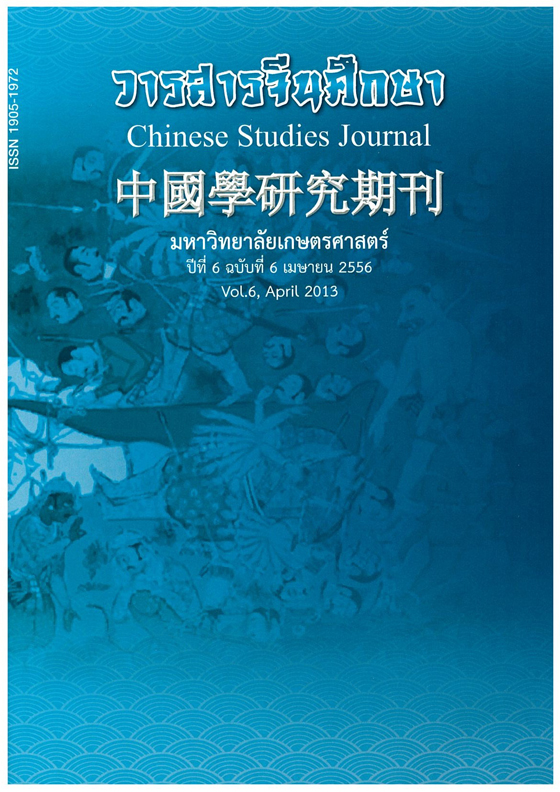การศึกษาเปรียบเทียบสำนวนจีนที่มีคำว่า “chī” กับสำนวนไทยที่มีคำว่า “กิน”
Main Article Content
Abstract
จากผลการวิจัยสรุปได้ว่า สำนวนจีนและสำนวนไทยที่มีคำว่า “กิน” ซึ่งสื่อ ความหมายเหมือนหรือคล้ายคลึงกันสามารถแบ่งได้เป็น 3 ประเภท คือ สำนวนจีนที่มีคำว่า “chī” กับสำนวนไทยที่มีคำว่า “กิน” เหมือนกัน สำนวนจีนที่มีคำว่า“chī” แต่สำนวนไทย ใช้คำอื่น และสำนวนไทยที่มีคำว่า “กิน” แต่สำนวนจีนใช้คำอื่น โดยผลจากการเปรียบเทียบ ทางด้านความหมายที่กล่าวมาข้างต้นสะท้อนให้เห็นถึงความเหมือนและแตกต่างกันของชาว จีนและชาวไทยในด้านสภาพแวดล้อม สภาพชีวิตความเป็นอยู่ ขนบธรรมเนียมประเพณี วัฒนธรรม ทัศนคติและค่านิยมต่างๆ
汉语中含“吃” 字的成语同泰语中含“kin” 字的成语的对比研究
这篇文章把含有“吃”字的汉泰成语进行对比研究,为了能了解它 的意义和异同。研究后发现:意思相同或相近的含有“吃”字的汉泰成语比 较方法可分为3 种形式;一,汉语用“吃”字的成语,泰语也用“kin”字 的成语。二,汉语用“吃”字的成语,但泰语用其他生词的成语。三,泰语 用“kin”字的成语,但汉语用其他生词的成语。结合上面的结论,可以反 映出汉泰民族文化的生活环境、文化习俗、社会价值的异同。
A COMPARATIVE STUDY OF CHINESE IDIOMATIC EXPRESSIONS CONTAINING THE WORDS “chī” WITH THEIR THAI EQUIVALENT /kin/
The purpose of this article is to do a comparative study of Chinese idiomatic expressions containing the word “chī” with their Thai equivalents /kin/, focusing on analyzing the similarities and differences between the two languages.
The result of the study shows that Chinese and Thai idiomatic expressions containing the words meaning “eat” which represent the same or similar meanings can be divided into three categories: ones with the word “chī” used in Chinese expressions and the word /kin/ used in Thai expressions that have the same meanings; ones with the word “chī” used in Chinese expressions while another word used in Thailand expressions; ones with the word /kin/ used in Thai expressions while another word used in Chinese expressions. The result of the comparison reflects the similarities and differences between the environments, ways of life, traditions, cultures, attitudes and values of Chinese and Thai people.
Article Details
ผลงานทางวิชาการที่ลงตีพิมพ์ในวารสารจีนศึกษา มหาวิทยาลัยเกษตรศาสตร์ เป็นลิขสิทธิ์ของผู้เขียนหรือผู้แปลผลงานนั้น หากนำลงในวารสารจีนศึกษาเป็นครั้งแรก เจ้าของผลงานสามารถนำไปตีพิมพ์ซ้ำในวารสารหรือหนังสืออื่นได้โดยมิต้องแจ้งให้ทราบล่วงหน้า แต่หากผลงานที่ได้รับพิจารณานำลงในวารสารจีนศึกษา เป็นผลงานที่เคยตีพิมพ์ที่อื่นมาก่อนเจ้าของผลงานต้องจัดการเรื่องปัญหาลิขสิทธิ์กับแหล่งพิมพ์แรกเอง หากเกิดปัญหาทางกฎหมาย ถือว่าไม่อยู่ในความรับผิดชอบของวารสารจีนศึกษา มหาวิทยาลัยเกษตรศาสตร์ ทั้งนี้ ความคิดเห็นต่างๆ ในบทความเป็นความคิดเห็นส่วนตัวของผู้เขียน ไม่เกี่ยวกับกองบรรณาธิการวารสารจีนศึกษา มหาวิทยาลัยเกษตรศาสตร์


